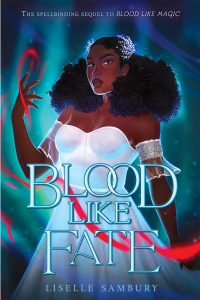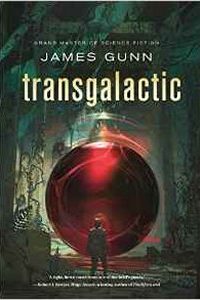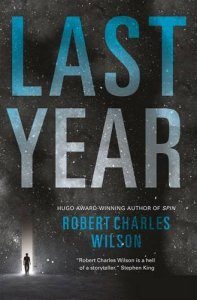Alex Brown Reviews Blood Like Fate by Liselle Sambury
 Blood Like Fate, Liselle Sambury (McElderry 978-1-53446-531-2, $19.99, 480pp, hc) August 2022.
Blood Like Fate, Liselle Sambury (McElderry 978-1-53446-531-2, $19.99, 480pp, hc) August 2022.
A young adult fantasy set in the near future that blends technology and magic? Yes, ma’am! Liselle Sambury’s Blood Like Magic duology tells the story of Voya, a teen witch in Toronto in the mid-21st century. Her family, the Thomases, is one of the original founding witch families in Canada. Centuries ago, her ancestors escaped slavery in the US and made their way north, first to Nova Scotia and then to Ontario. In the first book, Blood Like Magic, Voya was presented with an impossible task: in order to pass her Calling she must kill her first love. With some finagling, she spares Luc’s life, but at great cost to his and her families. Now with Blood Like Fate, those consequences come home to roost.
Voya is the new Matriarch of her family, but leading is harder than it looks. The adults are too busy squabbling with each other over decades-old grievances to take orders from someone they considered a child not too long ago. The ancestors aren’t speaking to Voya, and neither is Keis, her former best friend who is now permanently trapped inside the family home. Her grandmother’s clients are dropping their contracts as Voya struggles to figure out her grandmother’s secret recipe for their famously high-quality products. Justin, Luc’s supposedly dead father, is stuck inside a NuSap (an android body) and haunts the Thomas house as he plots a way out.
If that weren’t complicated enough, something weird is happening to the witches of Toronto. Every witch has a gift. Some are powerful, some are silly, and some are outright dangerous, and something is causing those gifts to go haywire. Voya has a vision of a deadly catastrophe, and Luc may be responsible for it. With the help of Eli, the son of another witch, Voya needs to infiltrate Luc’s company and stop him before it’s too late.
I have only three real complaints about this book. The first is one I have with a lot of young adult fantasies, and that is that I don’t buy that a bunch of adults would be fine letting a high school student run the show without any sort of guidance or regent to teach them the ropes. Expecting a teenager to make life-and-death decisions without any support simply because someone else declared them In Charge feels like the kind of wishful teenage fantasy you only see in fiction. Instead of constantly expecting teens to fend for themselves, I’d love to see more YA fantasy where adults step in to help their young leaders. We could use more elders teaching the younger ones instead of watching them struggle and stumble until they break.
The second is the romance between Luc and Voya. I always have trouble with instalove plots, and I haven’t figured out whether it’s just because it doesn’t work for me in general or it’s one of the many allo things that remain frustratingly inexplicable to me as an ace- and arospec person. In Blood Like Magic, Voya had to fall in love in a matter of weeks, and in Blood Like Fate, her love is now so unshakeable that she’s willing to cut Luc an extreme amount of slack before he’d even earned it.
Which leads me to my third issue: resolutions. Without getting into spoilers, several characters, Voya included, commit grievous harm to others in this duology. Voya apologizes for her harm and works to mitigate the consequences of that harm, but several other characters just sort of slide past it. They either aren’t held accountable or do the bare minimum of apologizing, and the way the ending is structured there are few to no consequences for those actions, nor are reparations made. A character who nearly causes the deaths of hundreds of people gets little more than a slap on the wrist, for reasons I can’t quite understand given that Voya’s cultural traditions are steeped in blood and violence.
All that said, I loved a lot of things in this duology. Sambury is exquisitely creative with her worldbuilding. Setting the story in near-future Toronto was a stroke of genius, and she deftly blends together technological advance ments, genetic modification, and magic. She also writes thrilling action set pieces. The way she throws us into a moment of high tension, it’s like doing a high dive into the deep end of a pool, shocking and exciting all at once. She can also handle quieter scenes as well, such as the discussions of a character’s eating disorder and another character’s drug addiction. Sambury approaches these topics with patience and care.
Blood Like Fate is a strong conclusion to a great duology. Liselle Sambury has a stellar literary mind, and I can’t wait to see where she takes us next.
Alex Brown is a librarian, author, historian, and Hugo-nominated and Ignyte award-winning critic who writes about speculative fiction, young adult fiction, librarianship, and Black history.
This review and more like it in the February 2023 issue of Locus.
 While you are here, please take a moment to support Locus with a one-time or recurring donation. We rely on reader donations to keep the magazine and site going, and would like to keep the site paywall free, but WE NEED YOUR FINANCIAL SUPPORT to continue quality coverage of the science fiction and fantasy field.
While you are here, please take a moment to support Locus with a one-time or recurring donation. We rely on reader donations to keep the magazine and site going, and would like to keep the site paywall free, but WE NEED YOUR FINANCIAL SUPPORT to continue quality coverage of the science fiction and fantasy field.
©Locus Magazine. Copyrighted material may not be republished without permission of LSFF.






